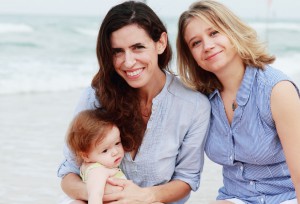
Build a family bond for life with reciprocal IVF at Texas Fertility Center
Advances in reproductive technology have resulted in newer and more creative family building options. For lesbian couples that want to share in the miracle of pregnancy, Texas Fertility Center offers reciprocal IVF. Reciprocal IVF enables one partner to contribute her eggs for fertilization with donor sperm, and the other partner to carry the pregnancy. The process allows both women to physically participate in the conception process.
With our reciprocal IVF program at Texas Fertility Center, experienced fertility specialists manage the cycle in much the same way as standard IVF. We provide expert guidance at every stage, from initial consultation, choosing a donor sperm bank and synchronized IVF cycles for both partners.
Egg retrieval for reciprocal IVF in LGBT couples

When eggs from one woman are used to create embryos to be transferred into the uterus of another woman, there are FDA regulations to follow to ensure the health of both partners and their future baby – even when the woman’s partner provides the egg (and is considered an egg donor).
Stipulations for egg donors include a comprehensive medical history, physical examination, blood testing, screening for familial, genetic and infectious diseases, and a psychosocial evaluation.
After this screening process, the woman providing the eggs will take hormonal medications that stimulate her ovaries, causing multiple eggs to mature at the same time. When the follicles that contain the eggs mature, the eggs are retrieved with ultrasound guidance while the woman is under light sedation. This egg retrieval process is identical to standard IVF procedures.
The final step in reciprocal IVF
The timing of the process of transferring the embryos into the partner’s uterus depends on whether the couple is using fresh or frozen embryos.
Fresh embryo transfer cycle: If the couple uses the fresh embryos created from recently retrieved eggs, then the cycles of both partners will be synchronized through hormonal treatments. This involves preparing the uterine lining in one partner for pregnancy, while at the same time, inducing the egg-contributing partner’s body to mature and release eggs.
Frozen embryo transfer cycle: If the couple is using previously frozen embryos, their cycles don’t need to be synchronized and their treatments will be independent of each other’s.
At Texas Fertility Center, we stand on the leading edge of fertility solutions for LGBT couples. The lesbian families we’ve helped build through our reciprocal IVF program are a strong testament to our commitment to bring babies into the lives of all types of hopeful families in the Austin, Round Rock and San Antonio areas.
Contact us to schedule an appointment to discuss the best path forward.












